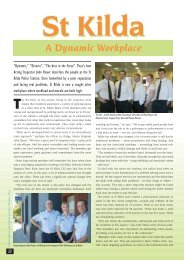Leading Senior Constables - The Police Association Victoria
Leading Senior Constables - The Police Association Victoria
Leading Senior Constables - The Police Association Victoria
You also want an ePaper? Increase the reach of your titles
YUMPU automatically turns print PDFs into web optimized ePapers that Google loves.
Review of <strong>Leading</strong> <strong>Senior</strong><br />
Constable Classification<br />
<strong>The</strong> <strong>Victoria</strong> <strong>Police</strong> Force Certified Agreement 2001<br />
(Agreement) introduced the classification of <strong>Leading</strong> <strong>Senior</strong><br />
Constable (LSC). This represented a partial result on the<br />
<strong>Association</strong>’s long standing claim for the introduction of the<br />
Master Patrol Concept. <strong>The</strong> Agreement provided for the introduction<br />
of 1,200 LSCs across the three operation departments that<br />
existed at the time: General Policing, Traffic and Operations<br />
Support and Crime. <strong>The</strong> allocation of positions, the development<br />
of the position description and administrative processes associated<br />
with filling the position were to be resolved in a joint working<br />
party. Clause 4.5.7.5 of the Agreement provides for the reestablishment<br />
of the joint working party after 3 years from certification<br />
of the Agreement to review policies and processes in relation to<br />
the position.<br />
In order to inform the <strong>Association</strong>’s position in this review the<br />
<strong>Association</strong> retained the Australian Centre for Industrial Relations<br />
Research and Training at Sydney University (ACIRRT) to conduct a<br />
survey of members on issues surrounding the LSC concept. In particular<br />
ACIRRT were asked to address whether the LSC concept:<br />
• provided a role model for less experienced members;<br />
• retained members in front line policing;<br />
• provided an alternative career path for <strong>Senior</strong> <strong>Constables</strong> that<br />
rewards and recognises the special skill and experience of front<br />
line police;<br />
• improved the experience profile across front line policing.<br />
<strong>The</strong> major component of the review methodology was a telephone<br />
survey of 423 members at the ranks of Constable, <strong>Senior</strong><br />
Constable, Sergeant and <strong>Senior</strong> Sergeant across areas where LSCs<br />
are allocated as well as areas where they are not allocated.<br />
FINDINGS<br />
Providing a ‘role model’ for less experienced members<br />
ACIRRT found that LSCs are performing their intended role.<br />
Around 80% of <strong>Constables</strong> believe the LSC classification has<br />
improved the development of less experienced members [Figure<br />
Figure 1. Proportion (%) believe LSC classification has improved development<br />
of less experienced members<br />
1] and the role is valued across all sample groups [Figure 2].<br />
Though this needs to be seen in light of how highly those workplace<br />
values the particular function performed by LSCs [Figure 3].<br />
Retaining members in operational policing<br />
Sergeants and <strong>Senior</strong> Sergeants reported that members have<br />
stayed in operational policing because of the LSC classification.<br />
<strong>Constables</strong> and <strong>Senior</strong> <strong>Constables</strong> also reported an increased likelihood<br />
of staying in operational policing [Figure 4].<br />
Approximately a third of <strong>Constables</strong> and LSCs said they were<br />
more likely to stay in operational policing due to the LSC career<br />
path. One in five Sergeants and <strong>Senior</strong> Sergeants said they were<br />
aware of members under their command who have remained in<br />
operational policing as a result of the LSC career path.<br />
Providing recognition and rewards to experienced front line<br />
policing<br />
Obviously the LSC classification has provided monetary rewards<br />
however most LSCs report that recognition of their skills and<br />
victoria police association journal, july 2005<br />
14<br />
Figure 2. Proportion (%) valuing functions of LSC
Figure 3. Proportion (%) regarding functions as important to their workplace<br />
experience, and mentoring also contribute to the job satisfaction<br />
[Figure 5]. However, the classification was seen as a barrier to<br />
career progression.<br />
Figure 4. Proportion (%) LSC classification has improved<br />
retention in operational policing (by rank and area)<br />
CHALLENGES<br />
ACIRRT’s review identified a number of challenges facing the<br />
<strong>Association</strong>.<br />
Fill LSC vacancies in stations where LSCs are needed most<br />
Considerable LSC unfilled vacancies exist in stations with the<br />
highest proportion of <strong>Constables</strong>. <strong>The</strong> LSC positions exist to<br />
attract experienced members to those stations to lift low experience<br />
profiles, however the pay differential has not been enough to<br />
encourage <strong>Senior</strong> Constable into these locations and the<br />
<strong>Association</strong> needs to look at alternative measures.<br />
Allocate LSCs where they are needed most<br />
<strong>The</strong> majority of members support the concept of LSCs working<br />
predominantly with less experienced members. This was also<br />
Figure 5. Proportion of LSCs (%) for whom job factors contribute to job satisfaction (by area)<br />
reflected in a view that LSCs should be in General Duties rather<br />
than other locations. Allocation of positions away from the “front<br />
line’ and where <strong>Constables</strong> were located, exposed the system to<br />
unnecessary criticism and reduced the numbers of less experienced<br />
members benefiting from working with LSC’s.<br />
Enlist more support from <strong>Senior</strong> Sergeants, Sergeants<br />
Sergeants and <strong>Senior</strong> Sergeants expressed concern over the implementation<br />
and management of the positions. In particular, a lack<br />
of differentiation in the role is leading to low morale among<br />
<strong>Senior</strong> <strong>Constables</strong>. <strong>The</strong>y were also concerned that many <strong>Senior</strong><br />
<strong>Constables</strong> prefer to wait for higher duties and pursue promotion.<br />
Consequently some of the <strong>Senior</strong> <strong>Constables</strong> most qualified to be<br />
LSCs are not applying for the jobs.<br />
Redress deficiencies in HR processes associated with the management<br />
and implementation of the system<br />
Problems with the management and implementation of LSCs were<br />
identified across all ranks and areas. Key issues included the<br />
description of the role, selection processes and criteria and the<br />
ban on working higher duties.<br />
CONCLUSION<br />
<strong>The</strong> survey results show that the LSC classification is achieving its<br />
basic objective of increasing the retention rate of experienced<br />
members in ‘front line’ policing and providing leadership and<br />
mentoring to less experienced members. However, the implementation<br />
has been plagued with difficulties. A majority of members<br />
support the concept but believe further clarification and consistency<br />
of application of the role, better allocation and improved selection<br />
processes.<br />
<strong>The</strong> challenge for the <strong>Association</strong> in the current review and EB<br />
2006 is to address these issues.<br />
victoria police association journal, july 2005<br />
15
















